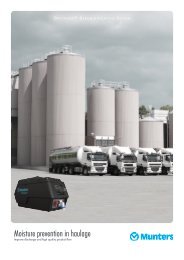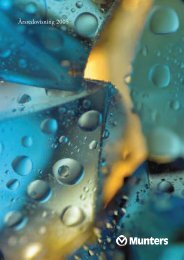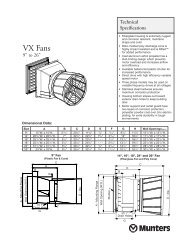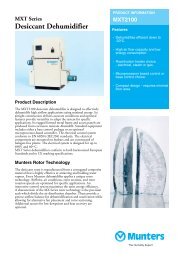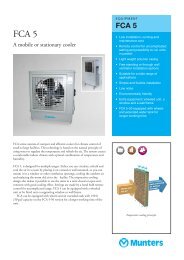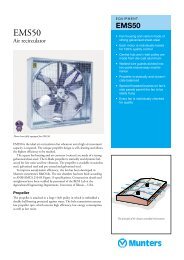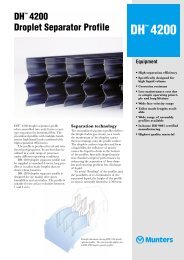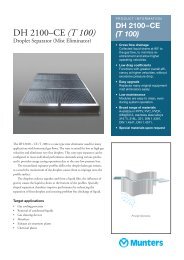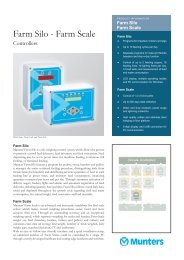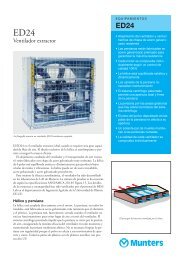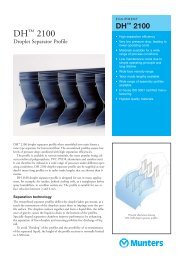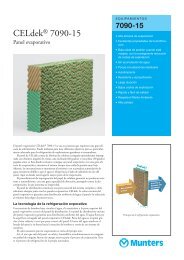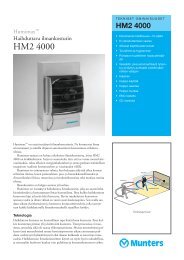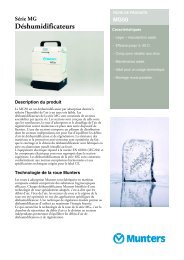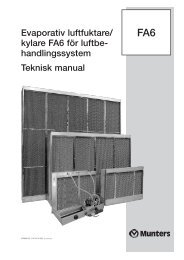Annual report 2008 - Munters
Annual report 2008 - Munters
Annual report 2008 - Munters
You also want an ePaper? Increase the reach of your titles
YUMPU automatically turns print PDFs into web optimized ePapers that Google loves.
Business focus<br />
11<br />
Quality and the environment<br />
The division’s quality and environmental manager is responsible<br />
for ensuring that production, product and service<br />
improvements take place based on the Group’s environmental<br />
and quality policy.<br />
The environmental policy contains the following general<br />
guidelines:<br />
• Prevailing legislation in the environmental area must be<br />
complied with and preferably exceeded<br />
• Environmental benefits of <strong>Munters</strong>’ products and services<br />
should be marketed<br />
• Employees must be involved and trained in environmental<br />
issues<br />
• Increased control of waste volumes<br />
• Increased recovery of material during damage restoration<br />
• Environmentally oriented work processes.<br />
The quality policy contains the following principles:<br />
• Employees must be aware of and understand the importance<br />
of quality<br />
• Organization and delegation of responsibility and authority<br />
relating to quality work must be documented<br />
• Customer focus, cost efficiency and the requirements of<br />
ISO 9001/2000 or the equivalent must be the starting point<br />
for production<br />
• Research and development of products, systems and service<br />
must be based on customer requirements and demand<br />
• Routines, processes and methods that ensure the desired<br />
quality must be documented and followed<br />
• Only suppliers that are able to satisfy <strong>Munters</strong>’ quality<br />
requirements may be employed<br />
• Marketing and sales activities may only create customer<br />
expectations that we can satisfy<br />
• Development of quality work must be followed up continuously<br />
through information, feedback and quality reviews<br />
• Quality-related work must be managed to achieve annual<br />
goals for quality improvements.<br />
<strong>Munters</strong> has 20 production plants around the world and conducts<br />
operations subject to permit and <strong>report</strong>ing obligations at<br />
13 plants. Within production, efforts have been made in certain<br />
local production plants to reduce production waste, as well<br />
as to use resources more efficiently. In producing new products,<br />
<strong>Munters</strong>’ goal is to reduce the impact on the environment.<br />
<strong>Munters</strong>’ product development, primarily of consumer products,<br />
is adapted to the EU’s RoHS (Restricted or Hazardous<br />
Substances) directive, which today is also self-evident within<br />
<strong>Munters</strong> in product development for the industrial market.<br />
Did you know<br />
When traditional air conditioning is used to cool<br />
an area, the humidity increases. This often results<br />
in growth of mold that is hazardous to health and<br />
moisture problems. In warm climates, there is therefore<br />
a demand for air conditioning in combination with dehumidification.<br />
However, traditional air conditioning is<br />
very energy-demanding. Several of <strong>Munters</strong>’ products<br />
for climate control are based on evaporative cooling.<br />
Evaporative cooling means cooling through evaporation.<br />
Water added to warm air becomes vapor and thus<br />
lowers the air temperature. This is the same principle<br />
that the human body uses when it produces sweat.<br />
Four grams of water added to one cubic meter of air<br />
lowers the air temperature by 10° C. This is a natural<br />
cooling method that does not require energy. It sounds<br />
simple, but it requires great expertise to achieve commercial<br />
solutions.<br />
<strong>Munters</strong>’ operations in Sweden<br />
<strong>Munters</strong> conducts operations subject to permit and <strong>report</strong>ing<br />
obligations that include emissions to air and water according to<br />
permit type B in the Environmental Code at its plant in Tobo.<br />
The permit covers all production operations in the plant and<br />
is valid until further notice. There are also noise restrictions.<br />
There are no injunctions within these areas. The production<br />
operations are environmentally certified according to ISO<br />
14000. The products are continuously adapted to the EU’s<br />
various environmental directives. Chemicals and other hazardous<br />
waste are collected and turned in for destruction. There are<br />
no environmental debts and no current disputes.<br />
Operations outside Sweden<br />
Of the Group’s operations outside Sweden, 12 plants conduct<br />
some form of operations subject to permit and <strong>report</strong>ing obligations.<br />
Detailed information about these plants is available<br />
at www.munters.com/sustainability. There are no environmental<br />
debts and no current disputes.<br />
<strong>Munters</strong> <strong>Annual</strong> Report <strong>2008</strong>



